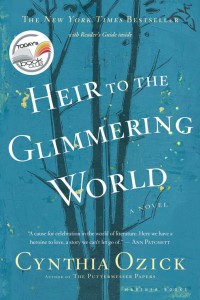 I found my copy of Cynthia Ozick’s 2004 novel Heir To The Glimmering World at a local library book sale, inconspicuously tucked between romance novels and penny dreadfuls. I had walked in with three dollars in change, enough to buy only two of the three books I’d pulled from the shelves, and thinking that Julian Barnes’ The Sense Of An Ending and Walter Isaacson’s Kissinger were less likely to avoid purchase, I left Ozick for the following day. My gamble paid off, though if I knew then how much I would enjoy it, I would not have taken the chance.
I found my copy of Cynthia Ozick’s 2004 novel Heir To The Glimmering World at a local library book sale, inconspicuously tucked between romance novels and penny dreadfuls. I had walked in with three dollars in change, enough to buy only two of the three books I’d pulled from the shelves, and thinking that Julian Barnes’ The Sense Of An Ending and Walter Isaacson’s Kissinger were less likely to avoid purchase, I left Ozick for the following day. My gamble paid off, though if I knew then how much I would enjoy it, I would not have taken the chance.
Ozick’s protagonist, and the narrator for much of the novel, is Rose Meadows, a young girl whose mother has passed away, leaving her in the care of her alcoholic and neglectful father. Here is our introduction to him:
It was my father’s habit to tell people my mother had died in childbirth: it had a nineteenth-century intimation of Tragic Loss. He said this to account for what he admitted was the shallowness of his paternal devotion. “The shallowness of my paternal devotion” – that was exactly how he put it. He cared (though not crucially) about the opinion of his colleagues and acquaintances, and would send out a stream of self-castigation in order, he hoped, to nip their condemnation in the bud. His intention was to arrive at his own condemnation fast and first. It was a kind of exculpation.
We have hardly been introduced to him and yet we hate him, thoroughly; bad enough that he be neglectful, that his paternal devotion is “shallow,” but that he himself can recognize this shortcoming and still fail to correct it – indeed, that he seeks exculpation without real contrition – makes him unforgivable. All but abandoned by her father, Rose retreats into reading and the domestic chores – the shopping, cleaning and cooking – necessary to keep the house functioning, until her father dies, abruptly, in a car accident, orphaning Rose some thirty pages into the novel. Rose’s reflection on her father is as good a summation of parental abuse as I have ever encountered, and a wonderful testament to Ozick’s powers as a writer: “My father had been a kind of daylight robber. He robbed dailiness of predictability, so that my childhood’s every breath hung on a contingency. Living with him had never felt safe.” Compare this, for example, to Kafka’s devastating accusation to his father: “You took on that enigmatic quality all tyrants have whose rights are based on their person and not on reason.” In both cases the child is robbed of any hope for stability.
Left without a home or caretaker, Rose is taken in by a distant relation through marriage, who gives her shelter and continues to pay for her schooling until his Communist girlfriend convinces him otherwise. Once again abandoned, Rose answers an ad for a live-in caretaker and finds herself in the home of a family of German refugees, the Mitwissers, headed by an invalid wife and a husband who demonstrates a greater devotion to the study of an obscure religious sect than he does to his five children. It is gradually revealed that the family survive thanks to a benefactor, a mysterious young millionaire named James A’bair, heir to an immense fortune made from children’s books patterned off his own person.
Ozick explores these family tensions, gradually grants us insight into her cast of misfit characters, and she does so in prose to rival any living fiction writer; half the joy of Heir To The Glimmering World is in being carried away by her writing. There is also a subtle debt to two Janes, Eyre and Austen, at times reverential and respectful and, at others, slyly mocking. Ozick pokes fun at the idea of marriage as a universal panacea, or at the deus ex machina plot devices of last-minute nuptials and men with hidden fortunes. Ultimately, Ozick’s narrator turns her back on these ideals, and we as readers, as witnesses to the folly, are left sympathizing.